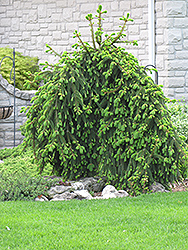>> Home
Height: 25 feet
Spread: 10 feet
Sunlight:
![]()
Hardiness Zone: 3a
Other Names: Norwegian Spruce
Description:
An artistic specimen or accent tree for the discerning landscape, featuring an erratic central leader and gracefully trailing branches that hang pendulously; narrow habit, but give adequate room for it to stand apart
Ornamental Features
Weeping Norway Spruce is primarily valued in the landscape for its highly ornamental weeping form. It has rich green evergreen foliage which emerges lime green in spring. The needles remain green throughout the winter.
Landscape Attributes
Weeping Norway Spruce is an evergreen tree with a strong central leader and a rounded form and gracefully weeping branches. Its relatively fine texture sets it apart from other landscape plants with less refined foliage.
This is a relatively low maintenance tree. When pruning is necessary, it is recommended to only trim back the new growth of the current season, other than to remove any dieback. Deer don't particularly care for this plant and will usually leave it alone in favor of tastier treats. It has no significant negative characteristics.
Weeping Norway Spruce is recommended for the following landscape applications;
- Accent
- Vertical Accent
Planting & Growing
Weeping Norway Spruce will grow to be about 25 feet tall at maturity, with a spread of 10 feet. It has a low canopy, and should not be planted underneath power lines. It grows at a slow rate, and under ideal conditions can be expected to live for 60 years or more.
This tree should only be grown in full sunlight. It does best in average to evenly moist conditions, but will not tolerate standing water. It is not particular as to soil type or pH, and is able to handle environmental salt. It is highly tolerant of urban pollution and will even thrive in inner city environments. This is a selected variety of a species not originally from North America.
